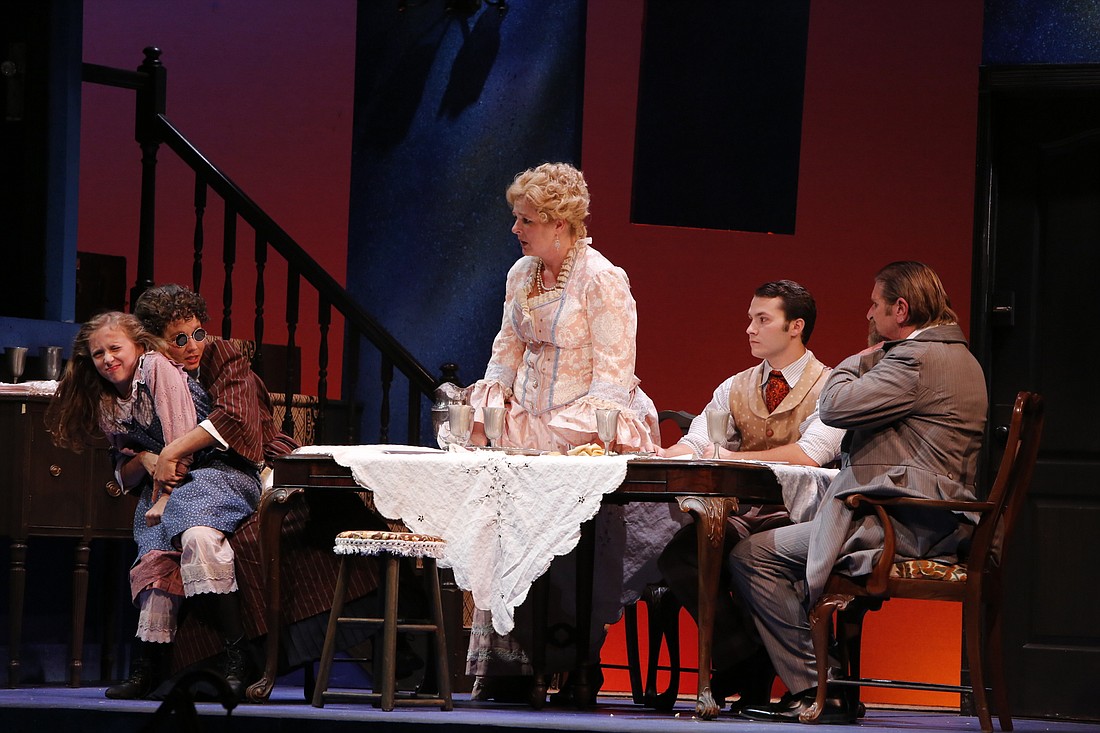- April 25, 2024
-
-
Loading

Loading

Venice Theatre is currently staging a powerful theatrical experience about a deaf, blind and mute prodigy who emerges from isolation to become a force for change in the world. No, we’re not talking “Tommy.” The play is William Gibson’s “The Miracle Worker.” In this case, the prodigal prodigy is Helen Keller.
In case you’ve just awakened from a trance, here’s the plot. Thanks to a fever in infancy, Helen Keller (Alexia King) lost her sight and hearing and never learned to talk. Thanks to her parents’ pity, she’s a spoiled wild child, ruling her Alabama household with tantrums and fits. At their wits’ end, the Kellers call in a teacher from the Perkins School for the Blind. That teacher is Annie Sullivan (Corinne Woodland) a 21-year-old Irish orphan who’d been raised the school, and only recently regained her sight after a series of painful operations. What Annie lacks in experience, she makes up for it in sheer toughness and intuitive insight into the mysteries of words. She locks horns with Helen and the battle of wills begins. Annie’s not content to merely civilize Helen. She wants to give her the key of language to unlock the mind she knows is trapped inside. The Kellers allow Annie to take Helen to the guest house and do her work there, free from family interference. But the clock is ticking. They give Annie two weeks to make the miracle happen.
It’s an emotionally gripping drama, all the more so because it’s true. A lesser director would milk this for sentimental sniffles. Director Kelly Woodland (who’s also Corinne’s mother) takes a you-are-there approach. She makes you feel like a fly on the wall as the battle for Helen’s soul rages.
Woodland and King are stunning as Annie and Helen. And when I say “stunning,” I mean that literally. Their battle royale at the supper table is worth the price of admission alone. Helen wants to eat off Annie’s plate, but Annie won’t let her. The test of wills nearly destroys the dining room — and the audience is gob-smacked in the process. That’s just one powerful scene out of many. Beyond raw emotion, the two leads convey their characters’ inner lives. You get a sense of the wheels turning in Annie and Helen’s minds. Brava!
The struggle unfolds on Tim Wisgerhof’s three-tiered set — a kind of exploded model of the Keller house. It’s both period specific and non-literal, the perfect setting for a character who’s both in the world and not. Nicholas Hartman’s period costumes nicely capture details of status. The Kellers are well-off. Nobody has to tell you. The clothes do. But the Southern finery seems ironic in context.
Annie’s war against Helen’s inner darkness is the heart of the play. A contemporary dramatist would probably have boiled it down to that. Gibson packs the play with background material. You see Annie leaving the institute. The voice of the brother she left to die at the orphanage periodically torments her. Gibson also puts a magnifying glass to the Keller family dynamic. You see the power struggles of the former Confederate captain (Michael Campbell), the son he dominates (Patrick Tancey), and wife who won’t be pushed around (Cheryl Andrews). An interesting glimpse of three characters experiencing a kind of Stockholm syndrome — virtual prisoners of a deaf, dumb and blind, seven-year-old tyrant. Fine performances and fine writing too, for these segments. But it feels like another play — a talky play written in 1957. Which, of course, it was.
I would have wanted more of a “bottle” play showing the two characters in the guest house and leaving the family off-stage and only implied. That’s not the Tony Award-winning play Gibson wrote. I can’t fault him for that.
So, take the play on its own terms. It’s a great evening of theater — an experience that’ll make you think and move your soul. (And, yes, we all know the scene where the audience breaks out the handkerchiefs. Tommy, just in case you’re out there, I won’t spoil it.)
Talky? Sure. But why not? It’s a play about language — a play that says language makes us human. Here, words are the real miracle worker.
If you feel like seeing a miracle, here’s your chance.